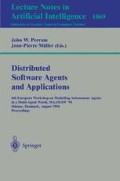Abstract
Advanced manufacturing control still remains an important topic in current research. Especially aspects of dynamics and failures in the production process are insufficiently taken into account by systems in use. This paper presents a multi-agent approach to scheduling material flow that shows dynamic and adaptive behaviour. Even though machine scheduling has found a thorough treatment in AI literature, there are only few investigations on the material flow problem. In this paper, it is argued that a decentralized architecture with centralized control fits well with the local and global aspects of the scheduling problem. The top-level algorithms of the scheduling process are outlined and further improvements required are sketched out.
Preview
Unable to display preview. Download preview PDF.
Bibliography
B. Burmeister, K. Sundermeyer: ”Cooperative Problem-Solving Guided by Intentions and Perception”, in: E. Werner, Y. Demazeau (eds.), Decentralized A.I. 3, North-Holland, 1992, pp. 77–82
B. Burmeister, A. Haddadi, K. Sundermeyer: ”Generic Configurable Cooperation Protocols for Multi-Agent Systems”, Pre-Proc. MAAMAW-93, Neuchâtel, 1993
J. Butler, H. Ohtsubo: ”ADDYMS: Architecture for Distributed Dynamic Manufacturing Scheduling”, in: A. Famili, D.S. Nau, S.H. Kim (eds.), Artificial Intelligence Applications in Manufacturing, AAAI Press/MIT Press, 1992, pp. 199–213
R. Davis, R.G. Smith: ”Negotiation as a Metaphor for Distributed Problem Solving”, in A.H. Bond, L. Gasser (eds.): ”Readings in Distributed Artificial Intelligence”, Morgan Kaufmann Publ., Ca., 1988, pp. 333–356
W. Dilger, S. Kassel: ”de Sich selbst organisierende Produktionsprozesse als Möglichkeit zur flexiblen Fertigungssteuerung”, in J. Müller (ed.): ”Beiträge zum Gründungsworkshop der Fachgruppe Verteilte Künstliche Intelligenz”, DFKI Document D-91-06, Saarbrücken, 1993
P.S. Ow, S.F. Smith, R. Howie: ”A Cooperative Scheduling System”, in M.D. Oliff (Ed.): Expert System and Intelligent Manufacturing, 1988, pp. 43–56
H. Van Dyke Parunak, P.W. Lozo, R. Judd, B.W. Irish, J. Kindrick: ”A Distributed Heuristic Strategy for Material Transportation”, Proc. of the Conference on Intelligent Systems and Machines, Rochester, MI, pp. 305–310
R. Smith: ”The Contract Net Protocol: High-Level Communication and Control in a Distributed Problem Solver”, IEEE Transactions on Computers, C-29(12), December 1980, pp. 1104–1113
Author information
Authors and Affiliations
Editor information
Rights and permissions
Copyright information
© 1996 Springer-Verlag Berlin Heidelberg
About this paper
Cite this paper
Bussmann, S. (1996). A multi-agent approach to dynamic, adaptive scheduling of material flow. In: Perram, J.W., Müller, JP. (eds) Distributed Software Agents and Applications. MAAMAW 1994. Lecture Notes in Computer Science, vol 1069. Springer, Berlin, Heidelberg. https://doi.org/10.1007/3-540-61157-6_31
Download citation
DOI: https://doi.org/10.1007/3-540-61157-6_31
Published:
Publisher Name: Springer, Berlin, Heidelberg
Print ISBN: 978-3-540-61157-8
Online ISBN: 978-3-540-68335-3
eBook Packages: Springer Book Archive

